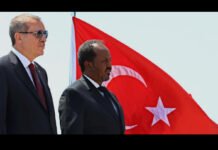By HAN News Desk
DJIBOUTI — The Chairman of the Somali National Youth Council, Mohamed Ali Siyad, is in Djibouti to participate in a high-level continental youth summit bringing together national youth leaders, ministers, and policymakers from across Africa to discuss the future of youth empowerment, governance, and sustainable development on the continent.
The meeting, convened by the African Union Commission (AUC), aims to strengthen the participation of young people in Africa’s political and socio-economic transformation. Discussions at the summit are focused on key themes including youth leadership, innovation, entrepreneurship, employment creation, peacebuilding, and regional integration.
Addressing delegates, AU officials emphasized that young people represent more than 60% of Africa’s population, and their inclusion in decision-making is crucial for building resilient institutions and achieving the goals of Agenda 2063, the African Union’s long-term blueprint for continental growth and stability.
Chairman Mohamed Ali Siyad’s attendance highlights Somalia’s renewed engagement with continental youth initiatives and its determination to promote youth leadership as a driving force for peace and national development. His participation is seen as part of a broader effort by the Somali government to give its youth a stronger voice in policymaking and to integrate them into regional dialogue platforms.
In recent years, the Somali National Youth Council has been at the forefront of programs aimed at capacity building, entrepreneurship training, and civic engagement, helping thousands of young Somalis gain skills and contribute to their communities.
Speaking ahead of the summit, Chairman Siyad reaffirmed Somalia’s commitment to regional cooperation and youth inclusion. “The future of Africa rests in the hands of its young people. We must invest in their leadership, their education, and their opportunities to build a peaceful and prosperous continent,” he said.
The Djibouti summit also provides a platform for networking and partnership-building among youth organizations, civil society groups, and government representatives from across Africa. Delegates are expected to issue a joint communiqué outlining recommendations to enhance youth participation in governance, peacebuilding, and economic development at both national and continental levels.
The event underscores the growing recognition of the strategic importance of youth in achieving Africa’s stability and prosperity, at a time when the continent faces challenges ranging from unemployment and migration to climate change and political instability.




